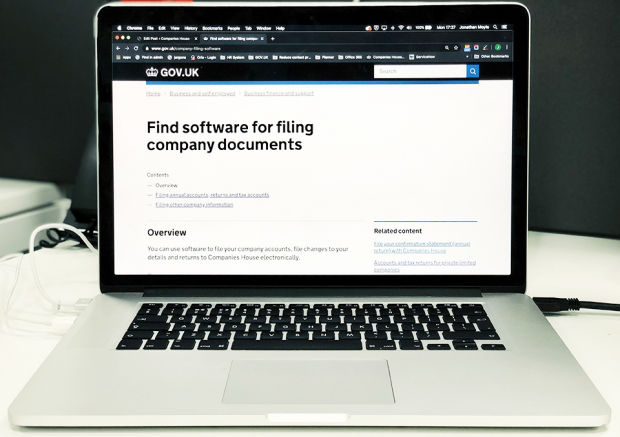Companies House is working towards becoming a fully digital organisation and digital enablement is an important driver of our filing strategy. A key part of this initiative is the wish to see accounts submitted in Inline eXtensible Business Reporting Language (iXBRL).
The iXBRL language is at the heart of electronic reporting worldwide. It has become the industry standard for digital reporting.
The EU recently chose iXBRL as the mechanism that companies listed on the Stock Exchange must use to file their consolidated accounts. And there's a new European single electronic format (ESEF) taxonomy that will be at the heart of the system.
Our digital strategy
In November 2019, our Director of Finance, Michelle Wall, presented a high-level view of the Companies House digital strategy to industry experts. The meeting was held at the Centre for Financial Professionals at Monument, in the financial district of London.
The presentation concentrated mainly on the benefits of structured data, as well as looking at the impact of this European directive.

Michelle spoke about the importance of structured data, giving an overview on where Companies House currently stands and what level of our accounts service is currently digital.
Using research by our Analysis and Corporate Insight (ACI) team, we were able to assign a monetary value to information on the Companies House register.
With over 6.5 billion searches on the register via the web, there's a massive appetite for company data. Michelle emphasised the potential for structured data to drive forward quality and transparency in financial reporting - and how it could be used to serve this vast market.
The future of Companies House is inextricably linked to digital transformation. Michelle highlighted the value of our data to the UK economy, and how we're hoping to use iXBRL as a key tool to provide this.
Corporate transparency and register reform
Michelle also spoke about how we're reforming the Companies House register.
Our vision is to make sure our data is accurate and usable. This would encourage confidence in the register, help increase investment, and through enhanced transparency, help tackle fraud.
The mission to drive quality would be a multi-faceted endeavour, working with other government departments to prevent misuse of company data. We want to do more cross checking of data with other relevant bodies to drive up quality, and to become a key player in providing quality iXBRL financial data.
There was also a positive message of the change for companies. The increased transparency and increased quality of data would allow companies to have complete control of the information available. This raises the potential for them to increase their reputation in the marketplace.
Pilot project with HMRC
Much of the day's presentation had focused on the potential benefits of using iXBRL data to prepare accounts. Building on this, Michelle talked about our project with HMRC to investigate anomalies between their different accounts data sets.
Although this was a pilot, the project identified £14.6 million of fraud and error. Michelle explained that we could potentially identify a further £96 million to £106 million of fraud and error if the pilot was expanded.
This caused a great deal of interest at the conference. The work by Companies House and HMRC validated many of the claims discussed by the international panel of speakers about the power of structured data.

Looking to the future
Michelle ended her presentation by describing how we want to increase the use of iXBRL to produce quality financial data. We want to work with industry experts to realise the full potential of iXBRL, and work with other government departments to achieve our goal.
Companies House aims to become the most innovative, open and trusted register in the world.
Michelle’s presentation was a great success. Being able to show tangible results of the use of iXBRL with actual examples, we were able to confirm what previous speakers had been saying.
The day showed just how important iXBRL accounts are becoming. A prime example is the move by the European Securities and Markets Authority (ESMA) to mandate iXBRL for listed companies in Europe.
At Companies House, we're serious about this matter. And we realise iXBRL could be a valuable tool to achieve some of its wider strategic goals.

2 comments
Comment by James Brankin posted on
I quite agree there is a real need for quality and transparency in financial reporting, but just how much policing of the quality of iXBRL submissions is carried out at Companies House I wonder.
Are iXBRL submissions accepted on face value? Once filed, are they sample checked later on for accuracy? Over the past 12 months, how many iXBRL submissions have been rejected, as a proportion of the total submissions, and for what reasons, might one ask?
For example, I often see the incorrect use of the sign="-" attribute within submissions which have been prepared using commercial accounts software and are accepted by Companies House. Surely the users of these datasets, provided by a Government agency, should expect them to be reliable and accurate.
Comment by Ellis Davies - Digital Content Designer posted on
Hi James, and thank you for your comment.
Companies are required to file a copy of the accounts that have been signed off by the board. Companies House performs minimal checks such as company name and number, but no checks are currently made on the content or tagging. When we are made aware that information on the register does not comply with the Companies Act, we may contact the company concerned and if necessary, request that the company updates their records.
The government has however, consulted on reforms to improve the accuracy and usability of data on the companies register, including asking if Companies House should explore the introduction of tagging standards of accounts in an iXBRL format. The government response to the consultation will be issued in due course.